Event Archive: 2016-2017
Did you miss a Clough Center event? Explore our archive below for past event information and visit our YouTube page for videos of recent conferences and lectures.
FALL 2016 LECTURES & CONFERENCES
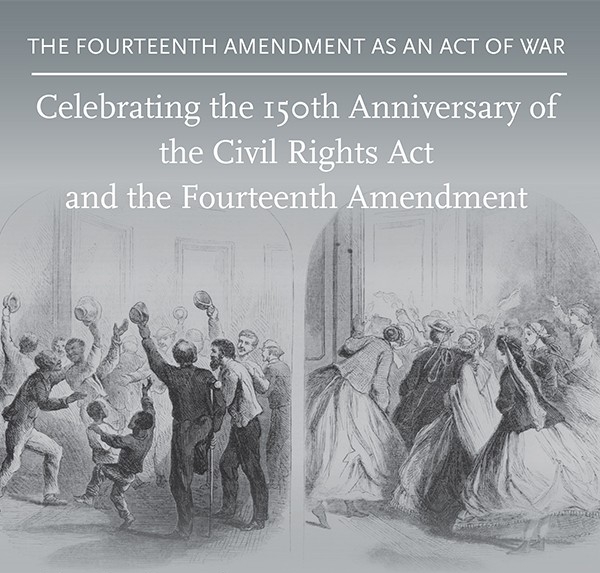
The Fourteenth Amendment as an Act of War
Tuesday, September 20, 2016
5:00 p.m.
Barat House, Boston College Law School
Michael Vorenberg is Associate Professor of History at Brown University, where he teaches and writes about legal and constitutional history, the American Civil War and Reconstruction, and Abraham Lincoln. He received his undergraduate degree and PhD from Harvard University. The author of Final Freedom: The Civil War, the Abolition of Slavery, and the Thirteenth Amendment (Cambridge University Press, 2001), which was a finalist for the Lincoln Prize, he is also the editor of The Emancipation Proclamation: A Brief History with Documents (Bedford/St. Martin’s, 2010). Currently he is completing a book on the end of the Civil War, as well as a longer study of the impact of the Civil War on American citizenship. He has served as a distinguished lecturer for the Organization of American Historians and a member of the editorial staff of the journal Law and History. He is the recipient of fellowships from the American Council of Learned Societies and the National Endowment for the Humanities. At Brown, he has received the McLoughlin Prize for teaching and the Romer Prize for advising. He has published numerous essays on the Fourteenth Amendment and the Constitution and has delivered many lectures on that topic as well.
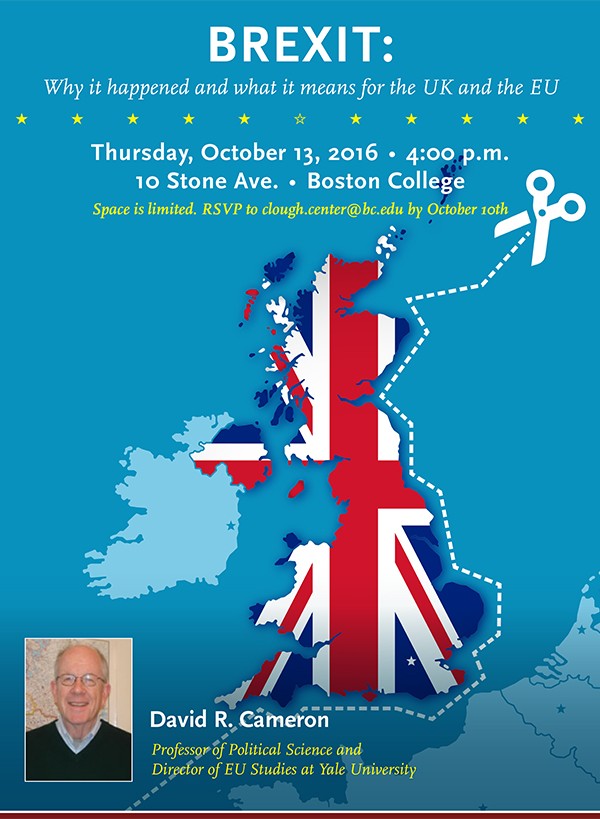
Brexit: Why It Happened and What It Means for the UK and the EU
Thursday, October 13, 2016
4:00 p.m.
10 Stone Ave, Room 201
Boston College
David Cameron is a Professor of Political Science at Yale and the Director of the Yale Program in European Union Studies. He has taught at Yale since 1975. He has served, at various times, as chair, director of graduate studies, and director of undergraduate studies of the department. He teaches courses on European politics and the European Union.
He has written extensively about the impact of trade openness on government and, with respect to the EU, about the initiative to complete the internal market, the operation of the European Monetary System, the negotiation and implementation of Economic and Monetary Union, the enlargement of the EU, the eurozone debt crisis, and, most recently, the EU’s Eastern Partnership and the crisis in Ukraine. His publications include “The Expansion of the Public Economy: A Comparative Analysis,” American Political Science Review, 1978 (one of the ten most-cited APSR articles in the 60 years between 1945 and 2005); Globalization and Self-Determination: Is the Nation-State under Siege? (Routledge, 2006), co-edited with Gustav Ranis and Annalisa Zinn; “Post-Communist Democracy: The Impact of the European Union,” Post-Soviet Affairs, Vol. 23, July-September 2007; “Creating Market Economies after Communism: The Impact of the European Union,” Post-Soviet Affairs, Vol. 25, January-March 2009; and “Post-Soviet Authoritarianism: The Influence of Russia in Its “Near Abroad,” Post-Soviet Affairs, Vol.28, January-March 2012.
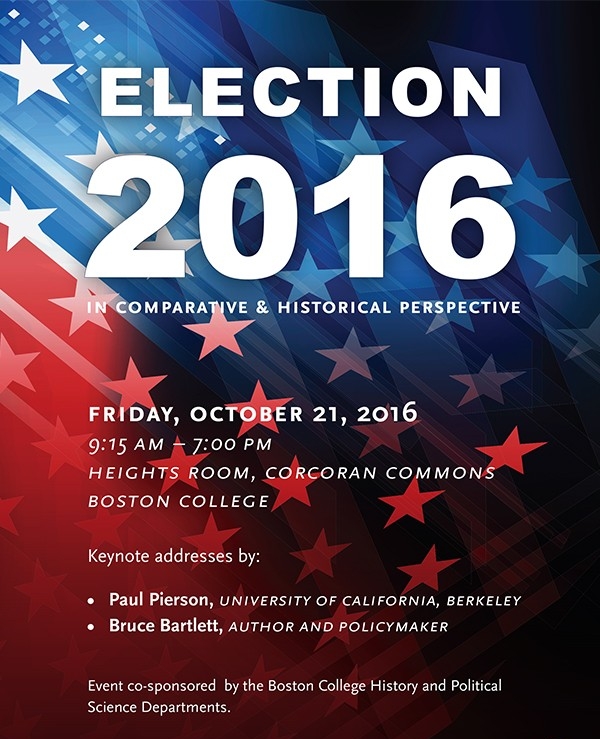
Conference: Election 2016 (In Historical and Comparitive Perspective)
Friday, October 21, 2016
9:15 a.m. – 7:00 p.m.
Heights Room, Corcoran Commons
The 2016 Presidential campaign promises to be the most exciting and perhaps the most significant in recent history. The major parties disagree more than they have since the 1930s. Divisions within the two parties are also greater than scholars and commentators, and politicians, can remember. Both Republicans and Democrats have experienced insurgencies that have explicitly aimed to topple party “establishments,” and the insurgent candidate actually won the Republican nomination. The contest between Hillary Clinton and Donald Trump is likely to be more bitter and nasty than Americans have experienced in their lifetimes. And, most important, the consequences of the vote on November 8th could be enormous. A Clinton victory would in theory be a vote for continuity, but in a fragile and volatile world change is inevitable, while a triumph for Trump would be a huge shock and would portend major shifts in domestic policy and in America’s role in the world. Neither party will be the same after the 2016 election, and significant rethinkings and realignments could be in the offing.
Friday, October 21, 2016
| 9:15 a.m. | Welcome |
9:30 a.m.
| Session I: Parties and the Electorate: Structures and Strategies
|
11:15 a.m.
| Session II: Trump, Clinton, and What They Tell Us about America
|
12:45 p.m.
| Lunch followed by Keynote Address by Paul Pierson, Political Science, University of California, Berkeley
|
2:00 p.m. | Session III: Issues, Interests, and Voters
|
3:30 p.m.
| Session IV: Consequences, Domestic and International
|
5:00 p.m.
| Keynote Address by Bruce Bartlett, author and policymaker
|
| 6:00 p.m. | Reception |
Alan Abramowitz is a popular expert on national politics, polling and elections. His expertise includes election forecasting models, party realignment in the United States, congressional elections and the effects of political campaigns on the electorate.
His election forecast has correctly and precisely predicted the popular vote winner within two percentage points or less in every U.S. presidential election since 1988.
Abramowitz, the Alben W. Barkley Professor of Political Science at Emory University, is the author or coauthor of five books, including "Voice of the People: Elections and Voting Behavior in the United States."
Alan Rogers is Professor of History at Boston College. He is the author of Murder and the Death Penalty in Massachusetts (2008);"State Constitutionalism and the Death Penalty," Journal of Policy History (2008); "The Death Penalty and Reversible Error in Massachusetts," Pierce Law Review (2008); and Boston: City on a Hill (2007).
Alexander Keyssar is the Matthew W. Stirling Jr. Professor of History and Social Policy. An historian by training, he has specialized in the explanation of issues that have contemporary policy implications. His book, The Right to Vote: The Contested History of Democracy in the United States (2000), was named the best book in U.S. history by both the American Historical Association and the Historical Society; it was also a finalist for the Pulitzer Prize and the Los Angeles Times Book Award. A significantly revised and updated edition of The Right to Vote was published in 2009. His 1986 book, Out of Work: The First Century of Unemployment in Massachusetts, was awarded three scholarly prizes. Keyssar is coauthor of The Way of the Ship: America's Maritime History Reenvisioned, 1600-2000 (2008), and of Inventing America (2003, 2nd ed. 2006), a text integrating the history of technology and science into the mainstream of American history. In 2004/5, Keyssar chaired the Social Science Research Council's National Research Commission on Voting and Elections, and writes frequently for the popular press about American politics and history. Keyssar's is currently completing a book entitled Why Do We Still Have the Electoral College? to be published by Harvard University Press.
Arthur Goldhammer—Center for European Studies, Harvard, author and translator—has a B.S. and Ph.D. in Mathematics from MIT and has taught at Brandeis University and Boston University. He has translated more than 125 books from French, for which he won numerous awards. His most recent award was for Thomas Piketty's bestseller Capital in the 21st Century. Goldhammer is also Co-Chair of the Contemporary Europe Study Group and Chair of the Visiting Scholars Seminar at Harvard's Center for European Studies.
Bruce Bartlett has spent many years in government, including service on the staffs of Representatives Ron Paul and Jack Kemp, and Senator Roger Jepsen. He has been executive director of the Joint Economic Committee of Congress, senior policy analyst in the Reagan White House, and deputy assistant secretary for economic policy at the Treasury Department during the George H.W. Bush administration.
Mr. Bartlett is also a columnist for The Fiscal Times, an online newspaper covering public and personal finance, and Tax Notes, a weekly magazine for tax practitioners and policy makers. He was previously a columnist for Forbes magazine and Creators Syndicate. His writing often focuses on the intersection between politics and economics and seeks to inform politicians about economics, and economists about the current nature of politics.
He is the author of the New York Times best-seller Impostor: How George W. Bush Bankrupted America and Betrayed the Reagan Legacy (2006) and The New American Economy: The Failure of Reaganomics and a New Way Forward (2009). His latest book, The Benefit and the Burden (2012), is a history and review of issues related to tax reform.
David A. Hopkins joined the Boston College political science department in 2010. His research and teaching interests include American political parties and elections, the U.S. Congress, voting behavior, public opinion, and research methods.
David is the co-author of the recently published Asymmetric Politics: Ideological Republicans and Group Interest Democrats (with Matt Grossman), and previously co-authored Presidential Elections: Strategies and Structures of American Politics (with Nelson W. Polsby, Aaron Wildavsky, and Steven E. Schier, Rowman & Littlefield, 2011). His recent articles include “The 2008 Election and the Political Geography of the New Democratic Majority” (Polity, July 2009); “The Empirical Implications of Electoral College Reform” (with Darshan J. Goux, American Politics Research, November 2008), and “The Political Geography of Party Resurgence” (with Laura Stoker, in Who Gets Represented?, Peter K. Enns and Christopher Wlezien, eds., Russell Sage Foundation, 2011).
His current research includes a project investigating the causes and consequences of increasing geographic polarization in American elections.
David Daley is the author of Ratf**ked: The True Story Behind the Secret Plan to Steal America's Democracy (W.W. Norton/Liveright) and the former editor-in-chief of Salon.com. He is the digital media fellow at the Wilson Center for the Humanities and the Grady School of Journalism at the University of Georgia. He is currently the publisher and CEO of the Connecticut News Project. He earned his B.A. in political science at Boston College and his M.A. in journalism at the University of North Carolina at Chapel Hill.
Ellen Fitzpatrick, a professor and scholar specializing in modern American political and intellectual history, is the author and editor of eight books, most recently The Highest Glass Ceiling (2016). Her book, New York Times bestseller Letters to Jackie became the basis of a highly regarded documentary film by Bill Couturie entitled Letters to Jackie: Remembering President Kennedy. Fitzpatrick served as Associate Producer. She has been interviewed as an expert on modern American political history by the New York Times, the Wall Street Journal, the Los Angeles Times, USA Today, the Boston Globe, the Washington Post, CBS’s Face the Nation, National Public Radio and has appeared on the PBS News Hour.
Professor of History at the University of New Hampshire, where she has been recognized for Excellence in Public Service, Fitzpatrick lives in Newton, Massachusetts.
Emily Thorson joined the Boston College political science department in 2015. Before that, she was an assistant professor at the School of Media and Public Affairs at George Washington University. She received a dual Ph.D in communications and political science at the Annenberg School and at the Department of Political Science at the University of Pennsylvania.
Her research focuses on information effects in politics, both on the aggregate and individual level. Specifically, she traces how political information and misinformation reaches citizens (through traditional and new forms of media as well as through informal interactions) and the conditions under which this information affects their attitudes and behavior.
Prof. Thorson's recent publications include “Belief Echoes: The Persistent Effects of Corrected Misinformation,” forthcoming in Political Communication; and “Beyond Opinion Leaders: How Attempts to Persuade Foster Awareness and Campaign Learning,” in Communication Research, February 2014.
Professor Heather Richardson teaches nineteenth-century American history at both the undergraduate and the graduate level. Her early work focused on the transformation of political ideology from the Civil War to the presidency of Theodore Roosevelt. It examined issues of race, economics, westward expansion, and the construction of the concept of an American middle class. Her history of the Republican Party, To Make Men Free (2014) examines the fundamental tensions in American politics from the time of the Northwest Ordinance to the present. She is currently working on an intellectual history of American politics and a graphic treatment of the Reconstruction Era.
Professor James Cronin teaches modern British and European history. Over the past decade his research interests have involved the relationship between states and social structures, political parties, and the rise and fall of the Cold War world order. He is is author of Global Rules: America, Britain and a Disordered World, published in 2014. Cronin's 2004 book, New Labour's Pasts, focused on the making of "New Labour" in Britain and its implications for the evolution of social democracy in Europe. He is currently working on a study of British and American foreign policy, and the Anglo-American alliance, since the crisis of the 1970s. Professor Cronin is an associate of the Center for European Studies at Harvard University, where he chairs the British Study Group, and he serves on the editorial boards of the Journal of Social History and British Politics. He has been awarded fellowships by the National Endowment for the Humanities and the German Marshall Fund and is a fellow of the Royal Historical Society.
Professor James O’Toole teaches courses in the history of American religion and the history of American Catholicism. His interests lie in the history of religious practice and popular devotional life. He has published a general history of the American Catholic laity from Colonial times to the present, and he is also studying the history of the practice of confession in America. He is currently writing a new history of Boston College.
Jill Greenlee's current scholarship investigates the relationships between major life cycle events, such as becoming a parent, and the political attitudes and behaviors of ordinary citizens. More broadly, she is interested in how individuals change politically as they move through the life course. Her book, The Political Consequences of Motherhood (2014, University of Michigan Press) investigates the complex relationship between motherhood and female political attitudes. It combines a historical overview of how motherhood has been used in the American political landscape over time with individual-level analysis exploring how and when motherhood shapes the thoughts and preferences of women.
In addition to research on gender, Greenlee has investigated questions related to racial attitudes and generational change. She is currently working on a co-authored book with Professor Tatishe Nteta of the University of Massachusetts, Amherst, that investigates the nature of racial attitudes among white Americans who came of age during the Obama presidency.
Greenlee has published work in journals such as Political Psychology, Politics and Gender, and P.S. Political Science and Politics. She teaches courses in American Politics, Women and Politics, Political Behavior, and Research Methods.
Kay Schlozman is the J. Joseph Moakley Professor of Political Science at Boston College and the recipient of the 2016 Career Achievement Lifetime Award from the by the section on Political Organizations and Parties of the American Political Science Association. Schlozman is the co-author of the The Unheavenly Chorus: Unequal Political Voice and the Broken Promise of American Democracy (2012), The Private Roots of Public Action: Gender, Equality, and Political Participation (2001) and Voice and Equality: Civic Voluntarism in American Politics (1995).
Kenneth Kersch is Professor of Political Science at Boston College. Kersch is the recipient of the American Political Science Association's Edward S. Corwin Award (2000), the J. David Greenstone Prize (2006) from APSA's politics and history section, and the Hughes-Gossett Award from the Supreme Court Historical Society (2006). He is the author of The Supreme Court and American Political Development (2006)(with Ronald Kahn), and Constructing Civil Liberties: Discontinuities in the Development of American Constitutional Law (2004).
Martin Summers is Associate Professor of History and African and African Diaspora Studies at Boston College. He is the author of “Arguing for Our Race”: The Politics of Non-recognition and the Public Nature of the Black Masonic Archive,” in Steven Kantrowitz and Peter Hinks, eds., “All Men Are Free and Are Brethren”: Prince Hall Fraternalism and the Rise of a People (2013); "'Suitable Care for the African When Afflicted With Insanity': Race, Madness, and Social Order in Comparative Perspective," in Bulletin of the History of Medicine84 (Spring 2010): 58-91; and Manliness and Its Discontents: The Black Middle Class and the Transformation of Masculinity, 1900-1930 (UNC Press, 2004), which received the 2005 American Historical Association-Pacific Coast Branch Book Award.
Paul Pierson is the John Gross Professor of Political Science at the University of California at Berkeley. Pierson’s teaching and research includes the fields of American politics and public policy, comparative political economy, and social theory. His most recent book is Winner-Take-All Politics: How Washington Made the Rich Richer and Turned Its Back on the Middle Class (Simon and Schuster 2010), also co-authored by Jacob Hacker. Pierson is an active commentator on public affairs, whose writings have recently appeared in such outlets as The New York Times Magazine, The Washington Post, and The New Republic. Pierson is also the author of Dismantling the Welfare State? Reagan, Thatcher, and the Politics of Retrenchment (Cambridge 1994), which won the American Political Science Association's 1995 prize for the best book on American national politics. His article "Increasing returns, path dependence, and the study of politics" won the APSA’s prize for the best article in the American Political Science Review in 2000, as well as the Aaron Wildavsky Prize for its enduring contribution to the field of public policy, awarded by the Public Policy Section of the APSA in 2011. He has served on the editorial boards ofThe American Political Science Review, Perspectives on Politics, and The Annual Review of Political Science. From 2007 to 2010 he served as Chair of the Berkeley political science department.
R. Shep Melnick is the Thomas P. O’Neill, Jr. Professor of American Politics. He teaches a variety of courses on American politics, including Courts and Public Policy, Ideas and Institutions in American Politics, Bureaucracy, Democracy in America, Rights in Conflict, and the American politics graduate field seminar.
Melnick's research and writing focuses on the intersection of law and politics. His first book,Regulation and the Courts, examined judicial influence on the development of environmental policy. His second, Between the Lines, investigated the ways in which statutory interpretation has shaped a variety of entitlement programs. His current research project looks at how the Rehnquist Court is reshaping our governing institutions.
Melnick is co-chair of the Harvard Program on Constitutional Government and a past president of the New England Political Science department. Before coming to Boston College 1997 he had taught at Harvard and at Brandeis, where he served as chair of the Politics department.
Professor Robert Murphy joined the Economics faculty of Boston College in 1984. He is Director of the International Studies Program and currently teaches courses on international economics, economic growth, and macroeconomic theory and policy. Professor Murphy’s research focuses on macroeconomics and international finance. He has been a visiting scholar at the International Monetary Fund and Federal Reserve Bank of Boston, and served as a senior economist at the President’s Council of Economic Advisors during the Clinton and Reagan Administrations. He is a member of the International Studies Academic Board.
Shana Gadarian is Associate Professor of Political Science at the Maxwell School, Syracuse University. Prior to her appointment at the Maxwell School, she was a Robert Wood Johnson Scholar in Health Policy Research at the University of California-Berkeley. Her primary research interests are in American politics, political psychology,political communication, and experimental methods.
Her book with Bethany Albertson, University of Texas, Anxious Politics: Democratic Citizenship in a Threatening World, published from Cambridge University Press, explores how anxiety over policy issues like immigration, public health, terrorism, and climate change affect how Americans seek political information, their trust in government, and public opinion. In a new project, she is working with a cross-national group of scholars from Norway, Finland, and Spain exploring the effects of terrorism on social capital, societal resilience, and public opinion across four countries. The project is funded by the Norwegian Research Council.
Her research has been funded by the National Science Foundation, Robert Wood Johnson Foundation, Norwegian Research Council, Campbell Public Affairs Institute, Princeton Policy Research Institute for the Region, and the Bobst Center for Peace and Justice.
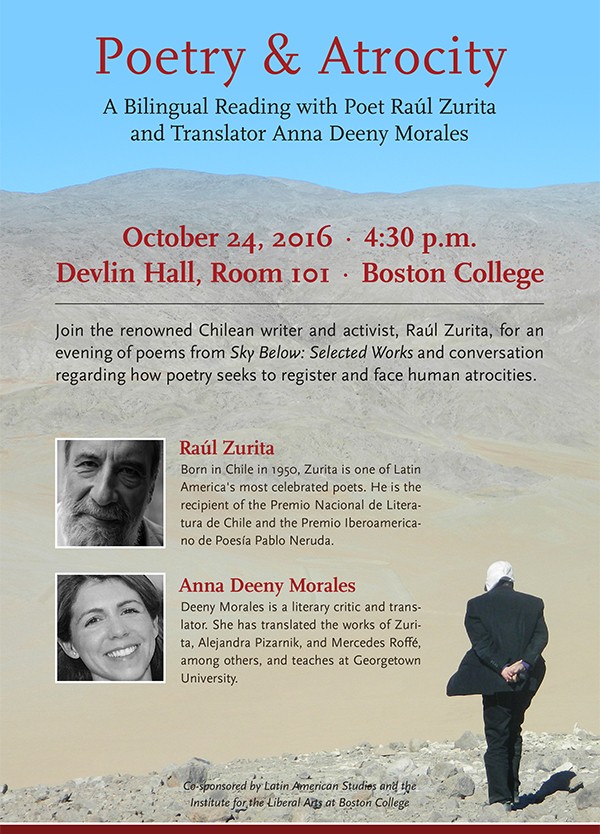
Poetry & Atrocity
Monday, October 24, 2016
4:30 p.m.
Devlin 101, Boston College
Join the renowned Chilean writer and activist, Raúl Zurita, for an evening of poems from "Sky Below: Selected Works," and conversation regarding how poetry seeks to register and face human atrocities.
Raúl Zurita is one of Latin America's most celebrated and controversial poets. After Augusto Pinochet's 1973 US-supported military coup that ousted Salvador Allende's democratically elected government, Zurita's poetry sought to register the violence and atrocities committed againt the Chilean people, as well as the corruption of the Spanish language. During the dictatorship (1973 to 1990), Zurita helped form the art collective, "Colectivo de Accion de Arte," using performance as an act of political resistance. From 1973 to 1990, he also published a trilogy of books titled "Purgatory,""Anteparadise," and "The New Life." Zurita was awarded the Chilean National Prize for Literature, a scholarship from Guggeheim Foundation, and he has held poetry readings at numerous American universities including: Harvard, Yale, Stanford, and Berkeley.
Anna Deeny Morales is a literary critic and translator. Her translations of Raúl Zurita’s works include "Purgatory" (2009), "Dreams for Kurosawa" (2011), and "Sky Below", a volume of selected poems recently published by Northwestern University Press. Her translation of "Floating Lanterns" by Mercedes Roffé was published by Shearsman Press in 2015. Deeny’s essays and translations of poetry by Alejandra Pizarnik, Nicanor Parra, Gabriela Mistral, Amanda Berenguer, Marosa di Giorgio, Malú Urriola, among others, have appeared in "Pinholes in the Night: Essential Poems from Latin America", The Paris Review, Mandorla, BOMB and The Harvard Review. Deeny received her doctoral degree from the University of California, Berkeley, and teaches in the Center for Latin American Studies at Georgetown University. Her book manuscript, Other Solitudes, considers transamerican dialogues on consciousness and poetry.
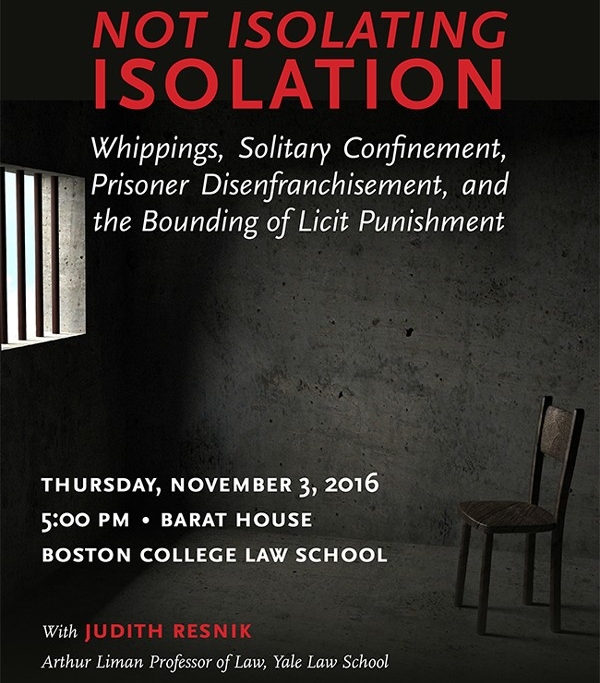
Not Isolating Isolation: Whippings, Solitary Confinement, Prisoner Disenfranchisement, and the Bounding of Licit Punishment
Thursday, November 03, 2016
5:00 p.m.
Barat House, Boston College Law School
Judith Resnik is the Arthur Liman Professor of Law at Yale Law School, where she teaches about federalism, procedure, courts, prisons, equality, citizenship, feminism, and local and global interventions to diminish inequalities and subordination. She currently chairs the Law School’s Global Constitutionalism Seminar and is the editor of its yearly books. Her other books include Representing Justice: Invention, Controversy, and Rights in City-States and Democratic Courtrooms (with Dennis Curtis, 2011), and Migrations and Mobilities: Citizenship, Borders, and Gender (co-edited with Seyla Benhabib, 2009). She co-edited (with Linda Greenhouse) the Daedalus volume The Invention of Courts, published in 2014. Recent articles and book chapters include “Within Its Jurisdiction”: Moving Boundaries, People, and the Law of Migration(Proceedings of the American Philosophical Society, 2016); Diffusing Disputes: The Public in the Private of Arbitration, the Private in Courts, and the Erasure of Rights (Yale Law Journal, 2015); Federalism(s)’s Forms and Norms: Contesting Rights, De-Essentializing Jurisdictional Divides, and Temporizing Accommodations (Nomos LV: Federalism and Subsidiarity, 2014); and Globalization(s), privatization(s), constitutionalization and statization: Icons and experiences of sovereignty in the 21 st century (11 International Journal of Constitutional Law (I∙CON), 2013).
Professor Resnik is the founding director of the Arthur Liman Program, supporting fellowships for law graduates and summer fellowships at several colleges, and sponsoring classes and colloquia on the civil and criminal justice systems. In 2015, the Liman Program joined with the Association of State Correctional Administrators in co-authoring Time-in- Cell: The Liman-ASCA 2014 National Survey of Administrative Segregation in Prison, providing data on the 80,000-100,000 people in isolation in U.S. prisons in 2014. From 2014 to 2016, Professor Resnik was a Phi Beta Kappa Visiting Scholar, travelling to various liberal arts colleges in the United States. In 2015, she was a visiting professor at Université Panthéon-Assas Paris II, and she also holds a term appointment as an Honorary Professor, Faculty of Laws, University College London.
In 1998, Professor Resnik was the recipient of the Margaret Brent Women Lawyers of Achievement Award from the Commission on Women of the American Bar Association. In 2001, she was elected a fellow of the American Academy of Arts and Sciences, and in 2002, a member of the American Philosophical Society, where she delivered the Henry LaBarre Jayne Lecture in 2005. In 2008, Professor Resnik received the Outstanding Scholar of the Year Award from the Fellows of the American Bar Foundation. In 2010, she was named a recipient of the Elizabeth Hurlock Beckman Prize, awarded to outstanding faculty in higher education in the fields of psychology or law. That year, Professor Resnik also had a cameo role in the Doug Liman film, Fair Game. In 2013, Professor Resnik was given the Arabella Babb Mansfield Award, the highest honor presented by the National Association of Women Lawyers. Her book, Representing Justice, has won several awards, including the 2014 Order of the Coif Award for its outstanding contribution to legal scholarship.
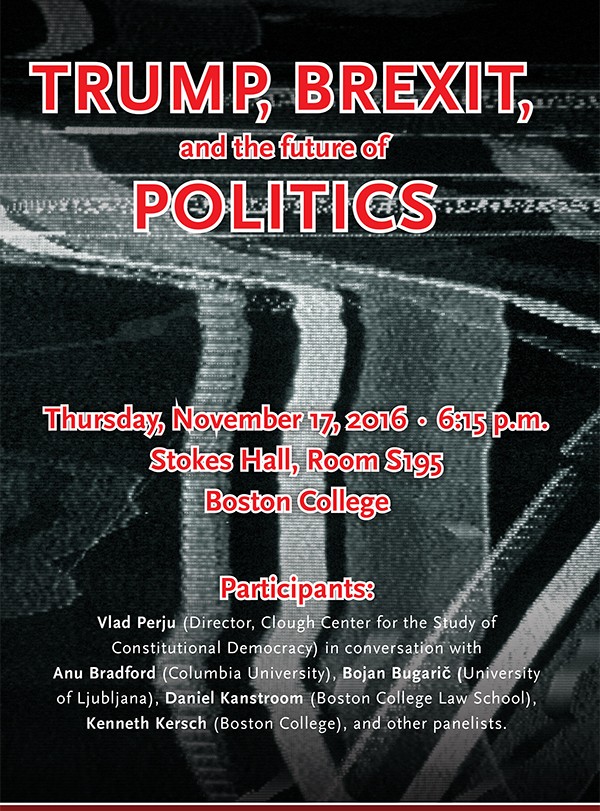
Trump, Brexit, and the Future of Politics
Thursday, November 17, 2016
6:15 p.m.
Stokes Hall, Room S195
Part of a two-day conference on The Future of European Constitutionalism, scholars and experts in the field of European constitutionalism, as well as constitutional jurisprudence come together to engage in the meaning making of the Brexit and election of Donald Trump. Panelists will bring forth discussions on the EU's ability to shape the rest of the world in its laws and regulations, in addition to a discussion on nation-state sovereignty and the duality of its supranational influence.
Anu Bradford is the Henry L. Moses Professor of Law and International Organization at Columbia Law School. She is also a Director of the European Legal Studies Center. Her research and teaching focus on international trade law, European Union law, and comparative and international antitrust law. Before joining the Law School faculty in 2012, she was an assistant professor at the University of Chicago Law School. She has also taught at Harvard College, Brandeis University, and the University of Helsinki.
Bradford earned her S.J.D. degree in 2007 and LL.M. degree in 2002 from Harvard Law School, and also holds a law degree from the University of Helsinki. After completing her LL.M. studies as a Fulbright Scholar at Harvard Law School, Bradford practiced antitrust law and EU law at Cleary Gottlieb Steen & Hamilton in Brussels for two years before returning to Harvard for her doctoral studies. She has also served as an adviser on economic policy in the Parliament of Finland and as an expert assistant to a member of the European Parliament. In 2010, the World Economic Forum named Bradford a Young Global Leader.
An Associate Professor of Law at the University of Ljubljana, Slovenia, Bojan Bugarič has published numerous articles on comparative constitutional law, comparative administrative law, European Union Law and law and development. His most recent publications include an article called Law and Development in Central and Eastern Europe: Neoliberal Development State and its Problems published by Cambridge University Press.
Bugarič is a visiting scholar at the Center for European Studies, working on his book project Authoritarianism versus Democracy in Post Communist Europe. The book will examine why constitutional democracies in Central and Eastern Europe struggle to maintain the rule of law as they face the challenges of the Euro crisis. His work will examine what makes institutions in Western democracies more resilient.
Bugarič served as Deputy Minister at the Ministry of the Interior in the Slovenian government from 2000-2004. He was a Fulbright Visiting Professor at the University of California, Los Angeles (UCLA), in 1998. He holds a Doctor of Juridical Science degree from the University of Wisconsin-Madison and a Masters of Law from UCLA.
Daniel Kanstroom is Professor of Law and Thomas F. Carney Distinguished Scholar at Boston College Law School, where he teaches Immigration and Refugee Law, International Human Rights Law, Constitutional Law, and Administrative Law. He is co-director of the Center for Human Rights and International Justice and co-founder of the Post-Deportation Human Rights Project, which seeks to conceptualize and develop a new field of law while representing US deportees abroad. He founded the Boston College Immigration and Asylum clinic in which students represent indigent migrants and asylum-seekers. Together with his students, he has provided counsel for hundreds of clients, won dozens of immigration and asylum cases, and authored amicus briefs for the U.S. Supreme Court and other courts in immigration and human rights cases.
Professor Kanstroom has published widely in the fields of U.S. immigration law, human rights, criminal law, and European citizenship and asylum law. He is the author of Aftermath: Deportation Law and the New American Diaspora (Oxford University Press 2012) and Deportation Nation: Outsiders in American History (Harvard University Press 2007). His most recent edited book, with psychologist M. Brinton Lykes, is The New Deportations Delirium: Interdisciplinary Responses (NYU Press 2015). He is also the co-editor, with sociologist Cecilia Menjivar, of Constructing Illegality (Cambridge University Press 2013).
His articles, book reviews and op-eds have appeared in such venues as the Harvard Law Review, the Yale Journal of International Law, the UCLA Law Review, the New York Times, the Washington Post, and the French Gazette du Palais.
Professor Kanstroom has taught at many universities including The Fletcher School of Law and Diplomacy, American University, the University of Paris, Northeastern School of Law, King’s College, London, the University of Hawai’i, and Vermont Law School.
He was a member of the national Immigration Commission of the American Bar Association.
Ken Kersch is professor of political science, with additional appointments in the university’s history department and law school. His primary interests are American political and constitutional development, American political thought, and the politics of courts. Kersch is the recipient of the American Political Science Association's Edward S. Corwin Award (2000), the J. David Greenstone Prize (2006) from APSA's politics and history section, and the Hughes-Gossett Award from the Supreme Court Historical Society (2006).
Professor Kersch has published many articles in academic, intellectual, and popular journals. He is the author of The Supreme Court and American Political Development (Kansas, 2006) (with Ronald Kahn), Constructing Civil Liberties: Discontinuities in the Development of American Constitutional Law (Cambridge, 2004), and Freedom of Speech: Rights and Liberties Under the Law (ABC-Clio, 2003). He is currently completing a book entitled Conservatives and the Constitution: From Brown to Reagan (Cambridge University Press).
Professor Kersch is member of the bar of New York, Massachusetts, and the District of Columbia. He received his B.A. (magna cum laude and Phi Beta Kappa) from Williams College, his J.D. (cum laude and Order of the Coif) from Northwestern University, and his Ph.D. in government from Cornell University.
Kersch has been a visiting professor at Harvard University (2008) and Bowdoin College (2015). From 2008 – 2012, he was Founding Director of the BC’s Clough Center for the Study of Constitutional Democracy. Prior to coming to Boston, Kersch was the inaugural Ann and Herbert W. Vaughan Fellow in the James Madison Program in American Ideals and Institutions (2001-2002), faculty associate in the Madison Program and the Program in Law and Public Affairs (LAPA), and assistant professor of politics (2003-2007) at Princeton University.
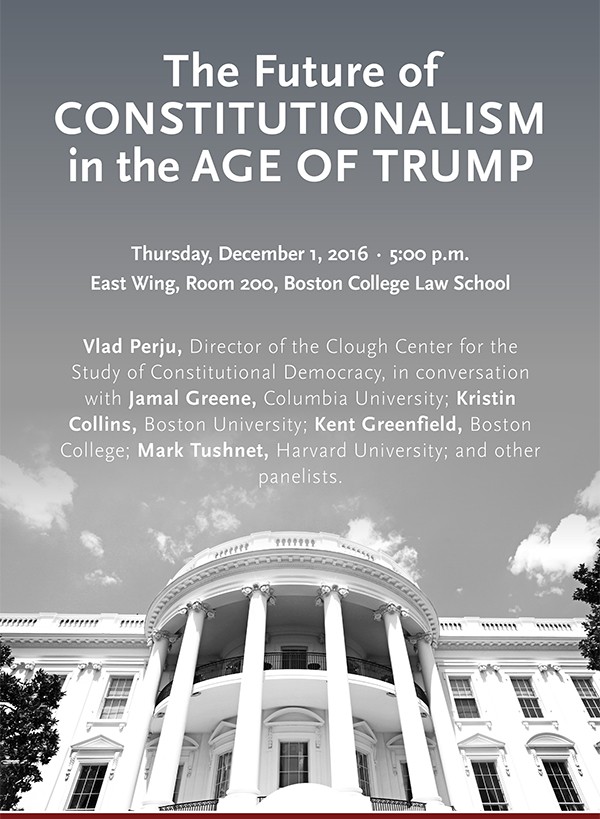
Future of Constitutionalism in the Age of Trump
Thursday, December 1, 2016
5:00 p.m.
Boston College Law School East Wing, Room 200
Part of the 12th International Human Rights Researchers' Workshop, this event explores constitutionalism in the wake of the 2016 US Presidential eleciton as it relates to aspects of globalization on constitutional law and rights, and what are the consequences of this redefined global constitutionalism?
Jamal Greene is a Vice Dean and Dwight Professor of Law at Columbia Law School. His area of expertise is constitutional jurisprudence and his teaching and research interests include Constitutional Law, Constitutional Theory, the First Amendment, Federal Courts, and Comparative Constitutional Law. Prior to joining the Law School faculty in 2008, Professor Greene was a law clerk to Judge Guido Calabresi, U.S. Court of Appeals for the Second Circuit, from 2005 to 2006 and a law clerk to Justice John Paul Stevens, Supreme Court of the United States, from 2006 to 2007.
Kristin Collins joined the faculty of Boston University School of Law in 2006. Her primary research and teaching interests are in the fields of civil procedure, citizenship law, family law, and legal history. Her work has appeared in the Yale Law Journal, Duke Law Journal,Vanderbilt Law Review, and Law and History Review, among others. In the fall of 2012, she held a National Endowment for the Humanities Long-Term Fellowship at the Massachusetts Historical Society, where her research focused on the role of family law in the administration and development of American citizenship and immigration law. In 2013-2014, Professor Collins was the Sidley Austin-Robert D. McLean Visiting Professor of Law at Yale Law School.
Following graduation from Yale Law School in 2000, Professor Collins served as a senior fellow at the Institute for Democracy in South Africa (IDASA) in Cape Town, where she conducted research on the South African Judiciary and, specifically, the enforcement of constitutional norms in South Africa’s courts. She clerked for Chief Judge John Walker, US Court of Appeals for the Second Circuit, and Judge Kimba Wood, US District Court for the Southern District of New York. Following her clerkships she practiced law with a civil rights law firm in New York City.
Kent Greenfield is Professor of Law and Law Fund Research Scholar at Boston College Law School, where he teaches and writes in the areas of business law, constitutional law, decision making theory, legal theory, and economic analysis of law. He is the past Chair of the Section on Business Associations of the American Association of Law Schools. In addition, he is the author of the book The Myth of Choice, published in 2011 from Yale University Press, Prunsoop Publishing (in Korean), and BiteBack Publishing (UK). Kirkus Reviews stated in its review: “The author deftly debunks prevailing dogma about the infallibility of free markets, especially important during a time when, as he reports, one in seven Americans are poor." He is also the author of the book “The Failure of Corporate Law” published by University of Chicago Press. The book has been called “simply the best and most well-reasoned progressive critique of corporate law yet written,” and the Law and Politics Book Review said that “it merits a place alongside Berle and Means, [and] Easterbrook and Fischel.” Read Kent Greenfield's full bio »
Mark Tushnet graduated from Harvard College and Yale Law School and served as a law clerk to Justice Thurgood Marshall, specializes in constitutional law and theory, including comparative constitutional law. His research includes studies examining (skeptically) the practice of judicial review in the United States and around the world. He also writes in the area of legal and particularly constitutional history, with works on the development of civil rights law in the United States and (currently) a long-term project on the history of the Supreme Court in the 1930s. and Public Affairs (LAPA), and assistant professor of politics (2003-2007) at Princeton University.

